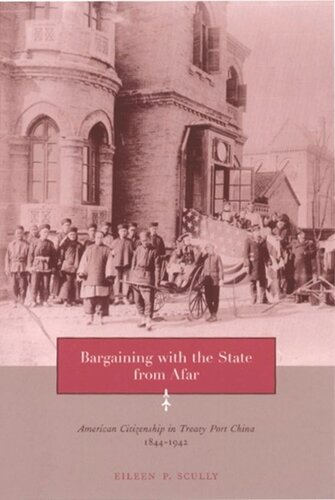

Most ebook files are in PDF format, so you can easily read them using various software such as Foxit Reader or directly on the Google Chrome browser.
Some ebook files are released by publishers in other formats such as .awz, .mobi, .epub, .fb2, etc. You may need to install specific software to read these formats on mobile/PC, such as Calibre.
Please read the tutorial at this link: https://ebookbell.com/faq
We offer FREE conversion to the popular formats you request; however, this may take some time. Therefore, right after payment, please email us, and we will try to provide the service as quickly as possible.
For some exceptional file formats or broken links (if any), please refrain from opening any disputes. Instead, email us first, and we will try to assist within a maximum of 6 hours.
EbookBell Team

5.0
38 reviewsIn the early 1990s, when organizations representing the 2.6 million U.S. nationals living abroad appealed to Congress for their own non-voting representative, the response of one Senator was to dismiss these "moans of the mink-swathed Americans abroad." However, the image of a life of luxury abroad is usually a harsher reality complicated by income taxes, military duty, and legal jurisdiction. What exactly is the obligation of a state toward citizens who live outside its borders? Bargaining with the State from Afar traces the relationship between the United States federal government and sojourning Americans living in the colonial enclaves of pre-World War II China. This group of Americans was not subject to Chinese law, but rather to an amalgam of laws borrowed from the District of Columbia and other territorial codes, as well as to local ordinances enacted by foreigners themselves. Scully explores U.S. government efforts to police this anomalous zone in the American policy and places the struggle between federal officials and sojourning U.S. nationals in the larger context of changing international law and modern citizenship regimes.She argues that the American experience with extraterritorial justice in China offers an important new vantage point from which to examine a singular area in the history of modern states. This case study of U.S. consular jurisdiction reveals the legal, political, and cultural process through which modern states have struggled to govern citizens outside their borders. Scully's examination of the U. S. Court for China is one of the first serious analysis of this anomalous institution.
In the early 1990s, when organizations representing the 2.6 million U.S. nationals living abroad appealed to Congress for their own non-voting representative, the response of one Senator was to dismiss these "moans of the mink-swathed Americans abroad." However, the image of a life of luxury abroad is usually a harsher reality complicated by income taxes, military duty, and legal jurisdiction. What exactly is the obligation of a state toward citizens who live outside its borders?
Bargaining with the State from Afar traces the relationship between the United States federal government and sojourning Americans living in the colonial enclaves of pre-World War II China. This group of Americans was not subject to Chinese law, but rather to an amalgam of laws borrowed from the District of Columbia and other territorial codes, as well as to local ordinances enacted by foreigners themselves. Scully explores U.S. government efforts to police this anomalous zone in the American policy and places the struggle between federal officials and sojourning U.S. nationals in the larger context of changing international law and modern citizenship regimes.
She argues that the American experience with extraterritorial justice in China offers an important new vantage point from which to examine a singular area in the history of modern states. This case study of U.S. consular jurisdiction reveals the legal, political, and cultural process through which modern states have struggled to govern citizens outside their borders. Scully's examination of the U. S. Court for China is one of the first serious analysis of this anomalous institution.